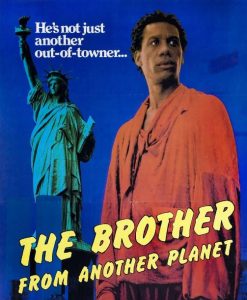
I don’t get it. John Sayles is one of our most consistent filmmakers, exploring stories and characters that most people won’t touch, and doing so with humor, intelligence, and compassion. His first love is the nature of community and how its inhabitants deal with complex matters of race and social class within that framework. From Matewan to Lone Star, Sayles has dared to expose our hypocrisies and challenge the idea that “relevant” films must always carry a heavy-handed political message. Sayles is in fact a political filmmaker, but he never pushes his agenda, preferring nuance to grandstanding. But that is the Sayles I thought I knew. Now, with his 1984 film The Brother From Another Planet on DVD, I can see that at one point in his career, he had no fucking idea what he was doing.
This film is dreadful; unfunny, obvious, dull, and throughout a pointless exercise that seemed to operate as an anti-drug manifesto that Nancy Reagan herself could approve of. Without Sayles’ name attached I would have dismissed it without a second thought (who am I kidding; with the premise, I wouldn’t even have rented the fucker), but considering the director’s reputation, I tried to give it every opportunity to succeed. It never did. I hated it as much as I have ever hated a motion picture, and even that is to understate my disgust. Never having contemplated that I could be utterly embarrassed during a Sayles film, I must hold all involved more accountable than usual. As I’m writing this review, it has come to me that I must put The Brother From Another Planet on a short list of the worst films made in the past twenty-five years. It sucks even more because it is so highly regarded.
The premise, as I said, is silly on its face — Joe Morton is the “Brother” of the title, a black alien from another world who lands on Earth and proceeds to have a series of boring adventures (all without uttering a word) while trying to evade capture by two white aliens from his home planet (one of whom is played by Sayles himself, in what must be regarded as the worst cameo by a director in history). The Brother walks into a bar, helps fix a video game by placing his hand on the back of the machine, and is then assisted by a patron who believes he is probably a homeless immigrant.
Although the Brother never speaks, the gaps are filled in by others who make assumptions, define him based on their own prejudices, and try to get him help. He gets a place to live through such methods, and is fitted with new clothes. The Brother even gets laid as he meets a lounge singer and becomes obsessed with her face. He also gets a job working at an arcade (fixing broken video games, of course).
If all of this sounds horribly lame, you are correct. Each scene is excruciatingly obvious in the attempt to show that yes, we humans judge others based on our own experiences rather than the individual we are dealing with. And yes, the silence of the Brother shows that we love to talk and as such we can claim to find another person “charming” and “sweet” even though we haven’t exchanged so much as a word. We often confuse one’s willingness to listen (or helplessness to do anything else) with compassion and empathy, and therefore often seek relationships with people who sit up straight and let us take care of things. But Sayles does not handle these issues with his usual class; he is more concerned here with clunky comedy and a morality play concerning drug dealers in a NYC ghetto. When the Brother visits a crime boss and through a laying of hands tries to show him the results of his criminal activity (something like a Vulcan mind-meld with mental pictures — okay, I’m a geek), the result is more like an After School Special than anything resembling drama.
Given that this film was made in 1984, it is clear that Sayles has moved beyond this early effort to be cute with sci-fi and social commentary. I admire the man for experimentation, but every aspect of this film is so wrong-headed that I wonder if he has quietly tried to distance himself from it. The presence of commentary on the DVD indicates that he continues to be proud, although I am not willing to sit through this shit again in order to hear his tortured rationalizations for this unmitigated disaster. Take away the big name and what you are left with is B-movie production values, cheesy dialogue, campy effects, and a story straight from the typewriter of your average eighth grader. I get enough of that from mainstream Hollywood; I expect more from the likes of John Sayles.